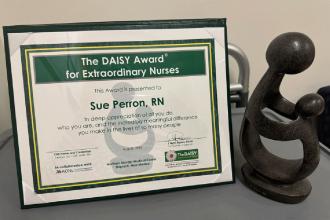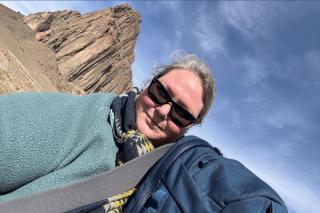Susan Perron ’18 came to Simmons as an adult student, pursuing her second bachelor’s degree. “I wanted a job that used both practical and critical thinking skills,” says Perron. “I wanted to do something helpful to humanity.”
Perron hadn’t found the right fit in the business sector, and was turned off by the bureaucracy of the state government. When she lost her job during the financial crisis of 2008, she decided it was time to explore her interest in nursing.
Perron began her journey by becoming a Certified Nurses Assistant (CNA), a job which she continued throughout her time as a Dix Scholar at Simmons. “Simmons did a really good job [welcoming] older students and diversifying the nursing program.” Perron had already attained a degree in cultural studies at an international college in Paris, and she appreciated the value Simmons placed on a diverse student population.
Simmons prepared her to be a Registered Nurse, and gave her the confidence to take her expertise where it was needed the most. “I had heard of Indian Health Services (IHS) while at Simmons, and wanted to join it. I wanted to work with populations struggling with gaps in healthcare, or difficulty accessing care.”
Given her background in cultural studies, working with a diverse community piqued her interest. “I called them [IHS] right before my NCLEX [National Council Licensure Examination]. They told me that it was best to go to a big medical center for a nursing residency, where you could see an array of different cases, get lots of experience, and then bring that knowledge and standards of care to a small, isolated place.”
With that plan in mind, Perron’s first nursing job brought her to Vanderbilt University Medical Center in Nashville, Tennessee. Years later, she knew when it was time for a change of pace. “I was a COVID-19 nurse throughout the pandemic, and it burned me out,” she recalls. “If you’re a good nurse, you take time to self-reflect. I thought, ‘I can’t keep doing this job the way that I’m doing it, and do it well.’”
Perron took the opportunity and moved to the Hopi Reservation in Northeastern Arizona. Providing ambulatory care to people on the reservation meant that Perron could work in a clinic and take a break from twelve-hour shifts. That said, the year on the Hopi Reservation presented her with challenges. “I had to drive two hours to Flagstaff to get groceries. We would lose power often, and the water was often shut off for maintenance.”
After a year on the reservation, she heard from Dr. Kimberly Mohs, who was looking for a nurse with palliative care experience to work for Indian Health Service at the Shiprock-Northern Navajo Medical Center. After receiving a thorough training in a hospice in Nashville, she met with Mohs in the Shiprock Service Unit (SRSU) [the largest geographical service-unit of Navajo Area Indian Health Service (NAIHS)], where they worked together to start a program for palliative care nursing in Navajo Nation.
“There are people in this area who don’t have the opportunity to have healthcare,” says Perron. “After COVID, they lost a lot of their nurses. If people were at home and their symptoms weren’t being managed well, they can’t get to the clinic. We need to go to them.” Palliative care offers management of pain, nausea, and appetite, and “comfort measures” for seriously ill patients. “I will go out to them and see them, assess the situation, then communicate to Dr. Mohs and coordinate the care they need.” She will also educate family members, empowering them to manage their loved ones' pain until she can return for continued care.
Perron emphasizes that understanding the Navajo belief system is integral to this kind of work. In addition to Dr. Mohs, Perron works closely with her colleague and mentor, Ida Bradley (Navajo) a nurse who specializes in medical terminology in the Navajo language and has extensive experience with end of life care within the Navajo culture. In addition to mentoring Perron, Bradley has written medical translations, offering new Navajo words for things like cancer, in an effort to dispel misconceptions about the disease.
“Anytime you go into a new environment, you have to acknowledge that you don’t know everything. You have to be brave enough to ask questions,” says Perron. “I’m not Navajo, but my mentor is Navajo. And my patients have been wonderful. They know they need somebody with expertise in end of life care to provide assistance. The patients and family members guide and teach me. Navajo culture wants people to understand where they are coming from. If you ask questions and want to know, they open up.”
This openness is part of being a nurse. “As a nurse, you learn to assess the situation, but you can never assume. I’ve found that if I tell them that I am unfamiliar with [a given belief] they tend to be open and understanding with that. It’s a work in progress, but I’ve gotten better. I’ve made real connections with patients and their families.”
Looking back on her time at Simmons, Perron sees it as a rigorous education that allowed her room to grow. “Our professors had high expectations, but it was a safe environment to grow and to learn, without fear of making mistakes. Simmons allowed us to freely ask questions and prepared us for hard things. When I left I had the confidence to ask questions, which I see as a sign of strength. It helped build our character as nurses and made us stronger.” In particular, Adjunct Marianne Williams and Associate Professor of Practice Kelly Marchant offered guidance and honesty throughout her education.

Perron values her work, but didn’t expect the recognition of the DAISY Award. “I see it not necessarily as a recognition of my work, but of everybody who put energy and time into teaching me how to be a nurse,” she says. “We are only as good as the nurses who influenced us. My teachers and colleagues have propelled me forward. An award like this is a testament, not only of my nursing practice, but is directly related to the awesome people throughout my nursing journey who have taught and inspired me along the way. I would argue that good nurses are not born overnight, but rather are a reflection of the nurses that have helped “raise” them.”
Addressing the Simmons community, Perron encourages students to broaden their horizons and bring their nursing expertise wherever it is needed. “If you’re passionate about working marginalized cultures and populations that desperately need healthcare, please do it! Seeing Navajo and Hopi cultures has given me a deeper understanding of the history of our country. I’m going to stay out here for a long time, if I have the opportunity.”

